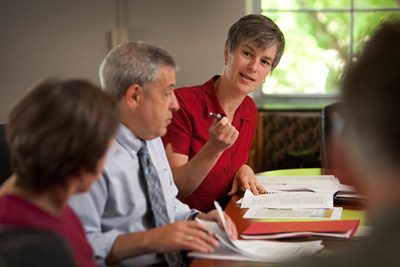Cornell passes first big hurdle toward 2011 reaccreditation
By Susan Kelley

Has Cornell defined what its students should have learned by the time they graduate? Do they actually learn that material? If not, how is the university improving its programs so that they do?
The answers to these and almost 100 more questions will determine whether Cornell is reaccredited in 2011.
In the meantime, Cornell has passed an important milestone in its quest for reaccreditation. The Middle States Commission on Higher Education, which accredits mid-Atlantic colleges and universities, has approved Cornell's proposed self-study, which is a list of questions Cornell will ask itself.
"The approval gives us the green light to move forward," said Marin Clarkberg, associate director of Institutional Research and Planning and Cornell's accreditation liaison officer.
"Your institution has prepared an excellent road map to guide you through a meaningful self-study," wrote Debra Klinman, Middle States' vice president, in a July e-mail to President David Skorton and Provost Kent Fuchs.
To be accredited, every 10 years Cornell must undergo a self-study that demonstrates the university meets 14 standards for accreditation. An external review team visits campus to confirm the report, then recommends Middle States take a specific action (such as to renew the accreditation). In summer 2011, the organization will act on the team's recommendation.
This year the university faces a particular challenge, because Middle States has dramatically changed its requirements since 2001, when Cornell was last accredited, Clarkberg said. In the past, Middle States concentrated on the quality of such academic components as library books, classrooms and faculty. Now it focuses more closely on educational results and has added a new standard: assessment of student-learning outcomes.
"That's a much harder job in many ways," Clarkberg said. "First you have to state your learning goals. For example, 'Students will improve their writing skills.' Then you need a plan for assessing whether they've achieved that goal. You have to collect that information and use it to improve the program."
The 13 other standards also have new assessment components. The standards cover every aspect of Cornell, from its mission and administration to its student support services and integrity. For example, Cornell must show that its Board of Trustees has written goals and that the university assesses if the board is meeting those goals.
To get a better understanding of Middle States' expectations for assessments, eight to 10 members of Cornell's reaccreditation steering committee will attend a Middle States workshop Sept. 24-25 at the University of Delaware, Clarkberg said. "We'll come back and formulate a plan for our campus."
Cornell's accreditation committee comprises some 60 faculty and staff members and students. A steering committee, co-chaired by Dean of Students Kent Hubbell and Dean of Human Ecology Alan Mathios, oversees six working groups. Now that the self-study proposal has been approved, the working groups will carry it out and report their findings to the steering committee next spring.
In addition to the accreditation of the entire university, Cornell has 21 programs accredited by specialized and professional organizations.
Media Contact
Get Cornell news delivered right to your inbox.
Subscribe